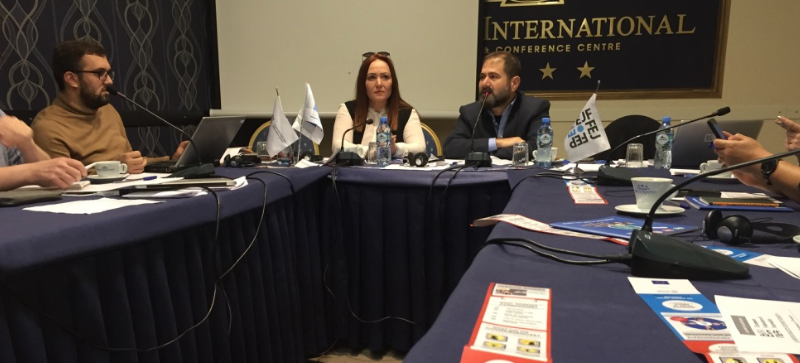15 points to improve working conditions for journalists in Western Balkans and Turkey

Bosnian / Türkçe / Shqiptar / Montenegro
The European Federation of Journalists (EFJ) together with its affiliate the Association of Professional Journalists in Albania (APJA) have successfully organised on 19/12/2016 in Tirana (Albania) the training of trainers’ workshop for Labour Rights Expert Group (LAREG+) in the framework of its Unesco supported project called Building Trust in media in South East Europe and Turkey (#TrustinMediaSEE).
Tim Dawson (NUJ President, UK) acted as expert during this event and gave the course based on his long serving experience as trade unionist in the United Kingdom to trainers from Albania, Bosnia and Herzegovina, Kosovo, Montenegro and Turkey as well as a Spanish trade union representative (LAREG co-chair). They learned and exchanged best practices, details and expertise on: 1) trade union recognition agreement, 2) components of wage claim, 3) multiple collective bargaining techniques, 4) annual wages reconsidering rounds, 5) validation of trade union advantage, 6) educating media owners, 7) work to rule practice, 8) general principal motions, 9) building links with workers in the same media groups, 10) using international networks of trade unionism, 11) encouraging journalists to organise collectively, 12) support the nurture of collective thinking, 13) the regular work of workplaces representatives, 14) workplace visibility and 15) dispute settlement procedures.
- Mimoza Koçiu (APJA, Albania) and Armand Shullaku (APJA President) stressed the lack of real negotiated contracts between Albanian journalists and their employers, the absence of independent journalists’ trade union and detailed the case of two TV programs being shut down following investigative reports. “Welcome to Albania, a country where the Prime minister referred to journalists as charlatans or the enemy of the people when they don’t publish favorable news for the government”, said a local journalist recently fired.
- The trainer from journalists association of Bosnia & Herzegovina expressed the good legal guarantees on paper but coupled with failed implementation. Main problems in BiH relates to transparency on public funding for the media sector, political affiliation of media outlets, high level of defamation cases and contracts not reflecting the real salary of journalists which is partly paid in black.
- The trainer from Kosovo shared the average salaries for journalists in his country as being between 200 EUR and 500 EUR with regular late payments, no annual vacations, no paid extra hours, only 1 day off per week.
- The trainer from Montenegro recalled the conclusions of the recent study published by the Regional Platform for Advocating Media Freedom and Security of Journalists – a network of journalist organizations and unions in Western Balkan countries. The average salary of a journalist is 500 EUR, censorship and self-censorship is high because of lack of transparency on public funding for the media industry.
- The trainer from Turkey gave a summary of all media violations since July 2016 failed coup d’Etat in the country with over 120 journalists in jail, 176 media closed and over 2.500 journalists fired without compensation. “Writing about Kurdish issue, the war in Syria or corruption cases remain tabous but not only hard news or politics is being controlled or attacked, even soft news coverage like Christmas or Santa Claus has become dangerous for journalists and may result with being fired from his position”.
Based on the ideas and good examples presented during the workshop by Tim Dawson, participants are requested to repeat this workshop locally for the benefit of their members. The EFJ will organise a follow-up ToT next year to measure the impact of this event.
—
The project Building Trust in media in South East Europe and Turkey is financially supported by Unesco and the European Union. All responsibilities regarding the contents and the actions belong to the authors only and should not be considered as reflecting the views of Unesco or the European Union.
Photo Credit : EFJ






